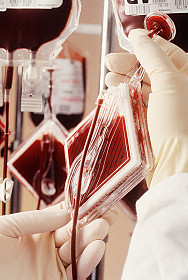 Researchers from the University of Washington and Puget Sound Blood Center have demonstrated that pathogen-reduction may be an effective method to prevent alloimmunization among patients receiving platelet transfusions. The findings were presented at the 54th Annual Meeting of the American Society of Hematology (ASH). Using an immunocompetent dog model, Dr. Sherrill Slichter and colleagues evaluated the impact of filter leukoreduction and pathogen-reduction to remove and inactivate antigen-presenting cells. Transfused platelets in a dog model simulated products received by human patients; transfused dogs received platelet-rich plasma, which was generated from whole blood to simulate non-leukoreduced apheresis platelets, or platelet concentrates from whole blood. Transfused dog recipients were matched with donors and acceptance of donor platelets was monitored over a series of 8 weekly transfusions. Results suggested that filter leukoreduction followed by pathogen-reduction was successful in reducing activity of antigen-presenting cells and preventing alloimmune platelet refractoriness. The research team suggests that similar results would be seen in human patients, including those who were immunosuppressed. Pathogen-reduction is commonly used by European transfusion services, and has been shown to be safe.
Researchers from the University of Washington and Puget Sound Blood Center have demonstrated that pathogen-reduction may be an effective method to prevent alloimmunization among patients receiving platelet transfusions. The findings were presented at the 54th Annual Meeting of the American Society of Hematology (ASH). Using an immunocompetent dog model, Dr. Sherrill Slichter and colleagues evaluated the impact of filter leukoreduction and pathogen-reduction to remove and inactivate antigen-presenting cells. Transfused platelets in a dog model simulated products received by human patients; transfused dogs received platelet-rich plasma, which was generated from whole blood to simulate non-leukoreduced apheresis platelets, or platelet concentrates from whole blood. Transfused dog recipients were matched with donors and acceptance of donor platelets was monitored over a series of 8 weekly transfusions. Results suggested that filter leukoreduction followed by pathogen-reduction was successful in reducing activity of antigen-presenting cells and preventing alloimmune platelet refractoriness. The research team suggests that similar results would be seen in human patients, including those who were immunosuppressed. Pathogen-reduction is commonly used by European transfusion services, and has been shown to be safe.
Reference
